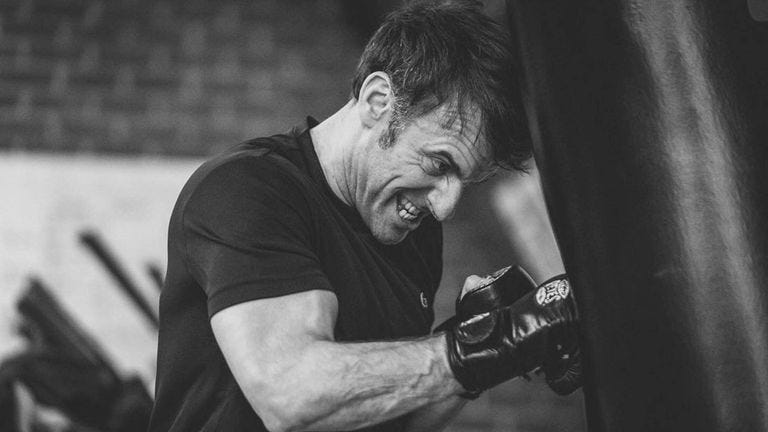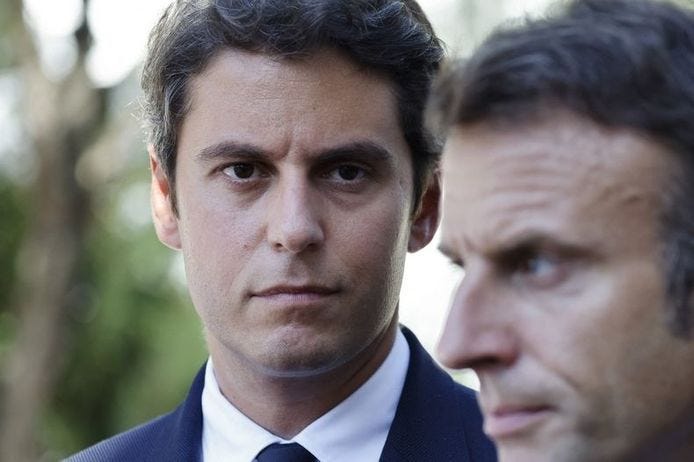Macron's Uncertain Future
Can the French President win a second term and build a legacy for himself? Foreign Policy grad Percy Spender investigates.
Written by foreign policy graduate Percy Spender, find more of his content on 𝕏 @PercySpender
Emmanuel Macron is a president without a legacy.
Perhaps this is why securing a victory in the upcoming June EU election is so important to him, he recently succeeded in winning a 5-year second term but this victory will be worth nil if he cannot cement his place in history. Macron is the first sitting French president to serve a second term since Chirac in 2002, and after the expiry of his term in 2027 he will be ineligible to run again afterwards. Long story short, the clock is ticking and the stakes are high.
Emmanuel Macron has been plagued throughout his reign with a struggle to define a core political project. In 2017, Macron’s ascension symbolised a smashing of the traditional political party landscape in France. The two dominant parties, the ‘Republicans’ and ‘Socialists’ were conquered, a loss from which neither have yet recovered. Macron became the figurehead of this budding centrist movement. When he retires from office, he may have accomplished a decade at the helm of French political power, but it will be meaningless without a remarkable capstone achievement.
A key tenet is addressing the elephant in the French political space. Macron lacks vigour and he does not inspire the youth whatsoever, this is evidenced by the results of the 2022 election, Macron's voter base skewed old, and he was unable to attract the youth vote. In the first round, 42% of his voter base was over the age of 64 and in the second round, the 70+ years old bracket voted 71% in his favour. Many of the 35 and younger voters begrudgingly side with him when their more radical Socialist parties are defeated in the first round of the election simply to keep the right-wing Le Pen out of office.
Macron recognises this generational problem. Seemingly he has deployed a dual tactic to save his legacy and institutionalise the position of his party ‘Renaissance’, and the carefully crafted centrist coalition ‘Ensemble’, in the French political system; to prevent them simply being swept away in the same fashion as the previously dominant ‘Republican’ and ‘Socialist’ parties. For stage one of this rejuvenation, Macron has taken aim at perhaps the most daring and lofty goals possible: re-establishing France as a geopolitical power, becoming the de facto leader of a militarised and ambitious EU bloc and finally breaking free from American strategic orthodoxy and modifying the dream of Charles De Gaulle for a 21st-century context.
Strategic autonomy is a phrase being sung from the Elysée Palace. This rebellion against American authority began in April last year when Macron gave an explosive interview, following a state visit to China, in which he stated his belief that Europe faces a great risk of becoming America’s followers and getting caught up in crises they need not become embroiled in; alluding to a war between China and America over Taiwan. To remedy this, he suggested Europe seek to reduce its dependency on the United States, this is where strategic autonomy sprang into the mainstream French political lexicon. He envisioned Europe collectively becoming a global power, which judging by his recent shift in rhetoric towards the Ukraine war over the last few months assumes it will be French-led. Coupled with this interview we saw a French company conducting the first liquefied natural gas trade deal in Yuan, with another similar gas deal in Yuan taking place later in 2023, further signalling the yearning to forge a new path for France in a post-American hegemonic world.
As for Ukraine, Macron has made a radical shift in rhetoric towards Russia and the war. For the first two years of the conflict, Macron was perhaps the most sympathetic leader in the West towards Russia, often making comments that he was willing to talk to Putin and that Russia must not be embarrassed. However, impossible to miss is Macron’s shift to signalling in favour of Ukraine’s defence as Russia continues to make gains towards key Ukrainian cities, Kiev and Odessa; the latter sharing a peculiar history with France having been under French occupation for 100 days during the Russian civil war. When many pundits expected him to walk back his fiery statements, he doubled down, just in the last few weeks France has announced they have a 2,000-strong troop contingent training for possible deployments to Ukraine. Pierre Schill, Chief of French Army Staff, went further in saying France is capable of having 20,000 troops ready to operate in Ukraine within only 30 days.
The second stage of this grand plan rests on a man called Gabriel Attal, who was widely popular while serving as education minister and is seen as a rising star in French politics, at just 35 he was installed by Macron as France’s youngest Prime Minister. This can be interpreted as a risky attempt to halt the unrelenting rise of ‘National Rally’, who has seen a surge in the polls over the last few months ahead of the June EU parliamentary elections.
Similarly, Macron’s implementation of domestic reforms tackling unemployment among a slew of economic challenges, and promising policy to reinvigorate the stagnant French economy are both attempts at winning over disgruntled voters lost to ‘National Rally’. Winning back these voters will be pivotal in the coming election, which will be the final chapter in the Macron v National Rally saga. A Macron loss will be a smear on Macron’s final term and indicate a declining sway over French politics, possibly fuelling dissent against his proposed reforms and foreign policy shift.
Macron’s approval rating has dropped 10% over the year to 30%, his lowest in 6 years and only 2% away from his worst. When Attal was given the Prime Minister position in January, Macron stated on X that he counts on Attal’s energy and regeneration in the spirit of 2017. A comprehensive restructuring is a compelling attempt to prevent a ‘National Rally’ victory in the June EU election and save Macron’s legacy from being tarnished by Le Pen and ‘National Rally’ getting the last laugh of this extraordinary rivalry. Macron hopes going all in on Attal as successor will lead to the continued success of the ‘Renaissance Party’ in French politics post-Macron. The domestic economic policy goals and the daring foreign policy shift underpin the success of this plan.
Significant challenges face Macron’s final term amid a rise in political polarisation expected to dominate Western nations and tear apart centrist parties. If he can reassert France as a formidable power, take leadership of EU defence and foreign policy, regain independence from American influence and undergo successful economic policy reform, Macron could achieve greatness. As the globe enters an era of multipolarity, France could end up as the leader of the European pole. Will Macron go down in history as the man to pull off such a feat?







